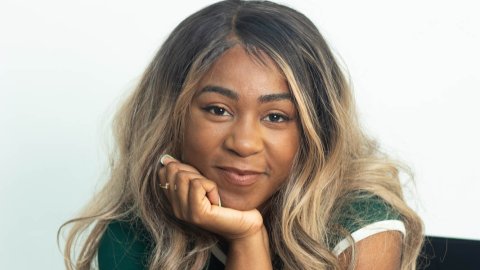
Euella Jackson Award-winning presenter, Filmmaker and Creative Producer.
on Mon 13 Oct 2025Euella Jackson reflects on her relationship with Black History Month
Posted on Mon 13 Oct 2025
In this article, Euella Jackson reflects on whether Black History Month is a tokenistic gesture or an essential act of storytelling, drawing on personal experiences of community, culture and change. She will continue this conversation with Edson Burton, hosted by Emmanuella Blake-Morsi, on Wed 15 Oct, 18:00 at Watershed.
My god-mother, Aunty Daffodil, is a successful, proud Black woman with a soul as beautiful as her name. When we were growing up, she made sure that her two children (and by extension every Black child she knew in the area) were proud to be Black too. She was the neighbourhood’s Aunty, her house a sprawling fortress with a large garden that we would gather in for birthdays and holidays. I have fond memories of her bustling New Year’s parties - kids running everywhere, the grown people drinking in the kitchen - bringing the Black community together in ways both generous and unexpected. Despite having a demanding job, I don’t remember a time when she wasn’t volunteering or giving her time to the community.
Every few weeks, we’d get get a call from Aunty Daffodil saying that she was coming to take us to this event or that talk; from African drumming classes, steel pan workshops, gospel choir concerts to art exhibitions, she would ferry us across the county to experience Black culture. There was no point in protesting. At that age, it felt as inevitable as death or taxes, you will be going with Aunty Daffodil or you better have a damn good reason as to why not. As a pre-pubescent teen who would much rather be reading a Malorie Blackman book or dancing in my room to the latest Beyoncé CD, I do remember the internal eye-rolls at the thought of having to go to yet another Black culture event. We’re already black, isn’t that enough?
As my cousin and I would march out our front door to clamber into Aunty Daffodil’s 4X4 (that might as well have been a mini-bus) we’d catch jokes with other local Black children who were in the back. Aunty Daffodil the chipper stewardess chaperoning us to our next black-powered adventure. Over the years, we’d spend most of our time with her in community halls, elders’ groups or cultural spaces. When I was 15, she got us involved in an oral history project in partnership with the local museum, where we would interview elders in the community about their experience coming to this country and settling in the small town where I grew up. What was it like back then? How is it different from now? What advice would you give young people of today? Even though there were definitely other ways I’d have preferred to spend my Saturday mornings, I had a sense, even back then, that what we were doing was significant. It was an intergenerational black history lesson that stays with me to this day.
Black History Month looks a lot different for me these days. The provocation, ‘Black History Month: Token Gesture or Essential Telling’, has had me reflecting on my own relationship with the month and how it's changed as I’ve gotten older. For many places, Black History Month is a convenient hook for capitalism to hang its goods and offerings. Whether it’s streaming services curating their BHM strands or organisations programming activity specifically in October, we’ve seen the month co-opted by marketing teams to sell us more products that take us further from ourselves and each other.
Even for me, BHM has become associated with consumption. I've lost count of how many times I've equated my attempts at reading 10 books by Black authors with having “a good BHM”. Yes, engaging with and paying for black works and literature is important, but knowledge alone isn’t always enough. Experience has shown us that those who know better, don’t always do better and there isn’t always the practical or material follow-through that feels needed. It feels like we sometimes miss a step about “what’s next?” or “how can we practically build from this?”. Currently, the focus is so much on consumption and education, that we’re not thinking about tangible change, either habitual or building systemic change that will make a material difference to the lives of Black people in this country year-round.
Part of the problem could be with language. In other months, words like ‘pride’ or ‘awareness’ are instructive about the month’s purpose. The word ‘history’ feels more opaque in a country that has never quite known what to do with it and how to handle it with care. Sometimes I fear that we’ve inherited the British way of seeing history either as a prized trophy or a taxidermy stag head above a mantle-piece, or an uncomfortable heirloom collecting dust in the back of a drawer; something to occasionally to be looked at, but never touched. We’re rarely taught how to use history as a tool, a springboard for radical futures or see it as a cautionary tale. We’ve never quite grasped history’s ways of repeating itself or learnt how to use history to heal. We don’t know how to engage with it, how we’re supposed to feel about it, and what we do with it when we have it. Or maybe we did know but we’ve lost it.
If I’m honest, the institutionalisation of Black History Month has fostered a passivity in me. With programming budgets often sitting with funders, local authorities, workplaces and organisations, you could argue that the month’s legitimacy has made it lose its radical, community edge. It’s gone from being something that was held by us; unofficial community leaders, the elders, educators, and the Aunty Daffodils of the world, to becoming something that lives mostly with institutions.
Because of the work I do, Black History Month has become something I mostly associate with work, either through being invited to speak on this panel or host that event. For Black friends of mine working in other contexts, the responsibility often falls on them to organise something for their workplace or at schools. There is a burden of responsibility to programme, to put on, to showcase. Working in the creative industries, there is a tension with October being me and my friend’s busiest time of year for work opportunities, yet there feels like there’s not much time for much else - bringing a bittersweet irony as to what and who Black History Month is and should be for.
At a time, where Black people and people of colour are being targeted and racist rhetoric is being emboldened in our public spaces, Black History Month is definitely still needed but the work needs to happen beyond the month. We need to be thinking radically about the purpose and use of Black History Month, moving from showcasing to building. How can the black community use the month to dream up radical futures and create pathways for getting there across the year? How do we set our old and young people up for success in a changing world? How do we interrogate the distribution of wealth and resources to and through the Black community in Bristol? How do we shape and influence policy, in ways that feel generative and forward-thinking? How do we take ownership over our archive and preserve stories that have been erased?
As I get older, I find myself thinking about Aunty Daffodil and how I might play a similar role in my community today. The work she did for us as kids was about service, it was about care, it was about community. Her work was informal, selfless yet highly strategic, planting the seeds in Black History Month so that our blackness blossomed all year round.

